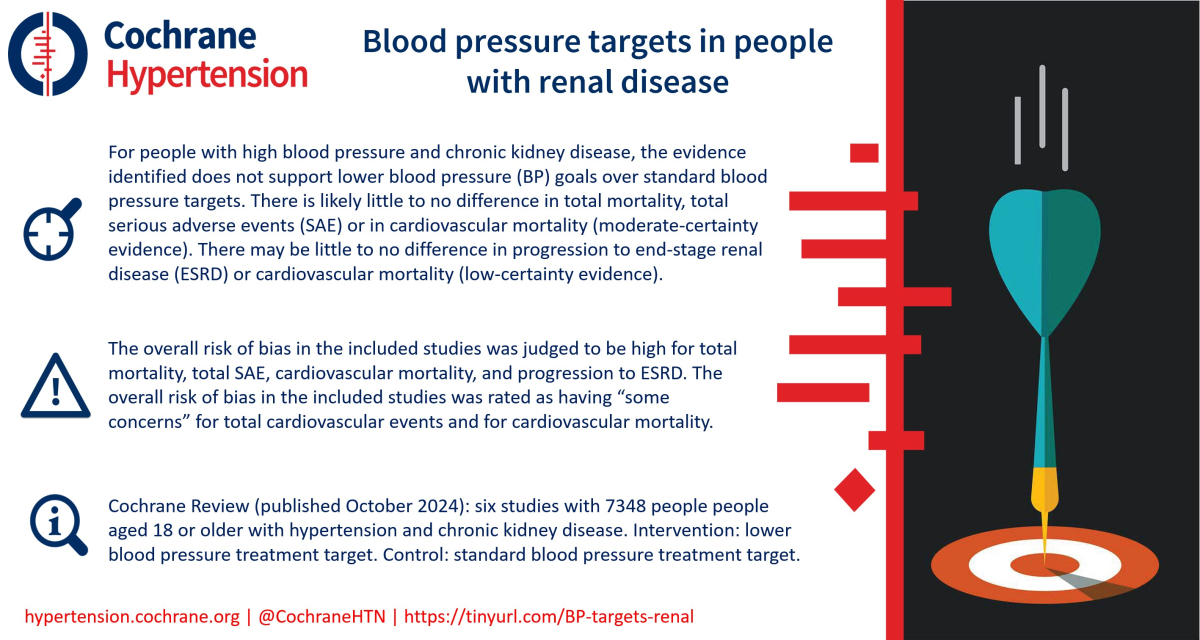Juan Erviti, Luis Carlos Saiz, Leire Leache, José Pijoan, Miguel Menéndez Orenga, Douglas M Salzwedel, Iván Méndez-López

Key messages
- Lowering blood pressure in individuals with high blood pressure (hypertension) provides health benefits. But we do not know by how much blood pressure targets should be lowered for people with both hypertension and chronic kidney disease.
- Compared to standard blood pressure targets, intensive (lower than standard) targets probably do not reduce deaths, serious unwanted and harmful events, or cardiovascular events (problems affecting the heart and blood vessels) in people with chronic kidney disease. Lower targets may not reduce deaths related to cardiovascular problems or slow the worsening of kidney disease.
What is chronic kidney disease?
Chronic kidney disease is a long‐term condition where the kidneys are damaged and fail to filter blood as well as they should. Chronic kidney disease can worsen over time and eventually the kidneys may stop working altogether. Hypertension (unusually high blood pressure) is the second most common cause of chronic kidney disease after diabetes.
How is chronic kidney disease treated?
There is no cure for people with high blood pressure and chronic kidney disease, but lowering blood pressure can help delay kidney disease progression. However, optimal blood pressure levels are still unclear.
What did we want to find out?
We wanted to find if lowering blood pressure below standard levels is better than maintaining standard blood pressure levels at preventing heart disease, progression of kidney injury, and death in people with high blood pressure and chronic kidney disease.
What did we do?
We searched for studies that investigated the benefits and harms of lowering blood pressure in adults with chronic kidney disease. Blood pressure is recorded as two numbers, such as 120/80. The first number is the pressure in the arteries as the heart pumps out blood during each beat, and is called 'systolic blood pressure'. The second number is the pressure as the heart relaxes before the next beat, and is called 'diastolic blood pressure'. A reading of 130/80 mmHg ('mmHg' is a common blood pressure measurement unit) is considered a low blood pressure target in the context of people with kidney disease and high blood pressure. We gathered studies that compared people assigned to lower blood pressure targets (130/80 mmHg or lower) with those assigned to standard blood pressure levels (140 to 160/90 to 100 mmHg). We compared and summarized the results of the studies and rated our confidence in the evidence. This review received no funding.
What did we find?
We found six studies involving 7348 people with chronic kidney disease and high blood pressure. The largest study included 4733 people relevant to our review, and the smallest study, 840 people. Participants were followed for between one and eight years. Three studies were conducted in the USA, one in the USA and Canada, one in several countries in the Americas along with Spain, and one in the Americas, Europe, and Southeast Asia. Three studies were publicly funded, two were privately funded, and one had both public and private funding.
We found that, compared to standard levels, lower blood pressure targets probably make little to no difference to the number of people who:
- died from any cause;
- had serious unwanted and harmful events;
- had cardiovascular events, such as stroke and heart attack, or problems with arteries and veins.
Lower blood pressure targets may make little to no difference to the number of people:
- who dies due to heart problems;
- whose kidney disease worsened.
What are the limitations of the evidence?
A main limitation of the evidence was that all six studies allowed participants and clinicians to know to which treatment group each participant was assigned. Also, the studies provided very scarce information on serious unwanted and harmful events. All the studies measured people's blood pressure in medical offices, and the results might differ if people's blood pressure is measured in different settings (e.g. at home).
How current is the evidence?
The evidence is current to 8 August 2023.
Read the review: Blood pressure targets for hypertension in people with chronic renal disease
Erviti J, Saiz LC, Leache L, Pijoan JI, Menéndez Orenga M, Salzwedel DM, Méndez-López I. Blood pressure targets for hypertension in people with chronic renal disease. Cochrane Database of Systematic Reviews 2024, Issue 10. Art. No.: CD008564. DOI: 10.1002/14651858.CD008564.pub3. Accessed 15 October 2024.
